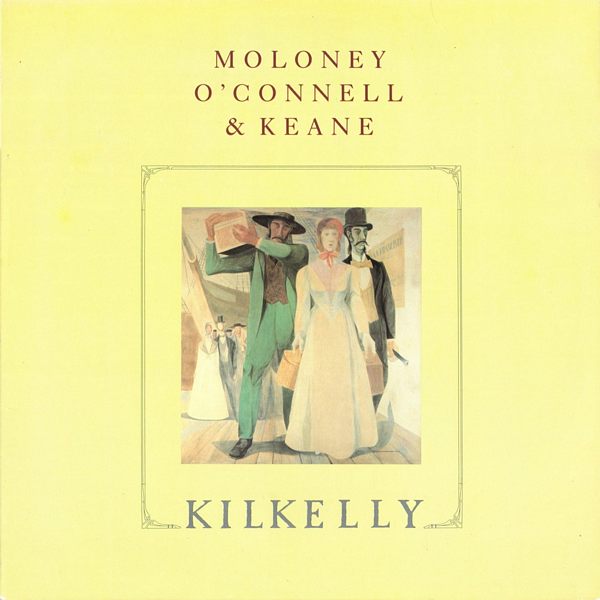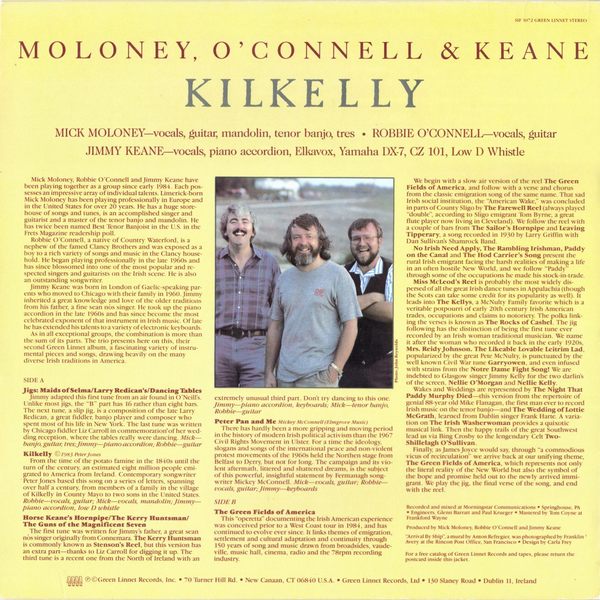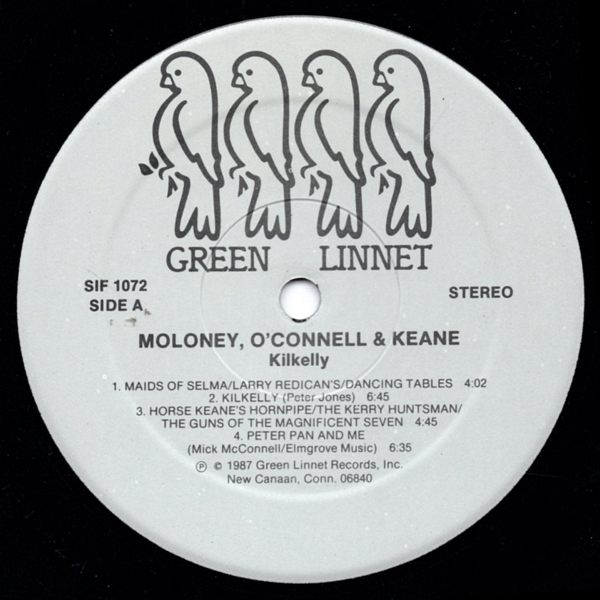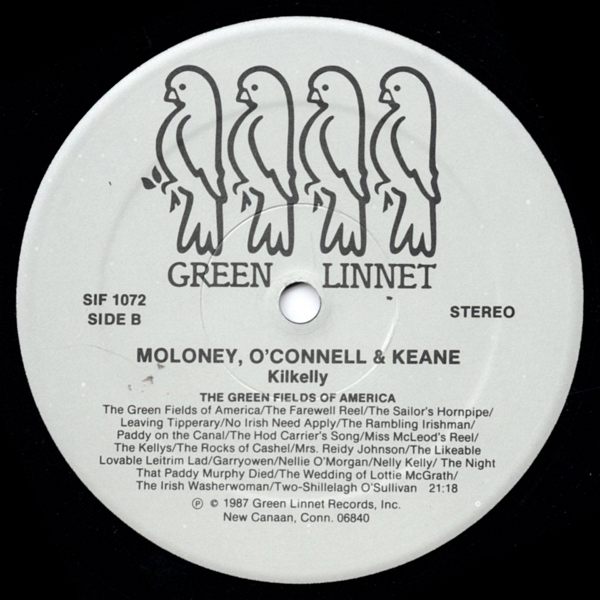
 |


 |
Sleeve Notes
Mick Moloney, Robbie O'Connell and Jimmy Keane have been playing together as a group since early 1984. Each possesses an impressive array of individual talents. Limerick-born Mick Moloney has been playing professionally in Europe and in the United States for over 20 years. He has a huge storehouse of songs and tunes, is an accomplished singer and guitarist and a master of the tenor banjo and mandolin. He has twice been named Best Tenor Banjoist in the US. in the Frets Magazine readership poll.
Robbie O'Connell, a native of Country Waterford, is a nephew of the famed Clancy Brothers and was exposed as a boy so a rich variety of songs and music in the Clancy household. He began playing professionally in the late 1960s and has since blossomed into one of the most popular and respected singers and guitarists on the Irish scene. He is also an outstanding songwriter,
Jimmy Keane was born in London of Gaelic-speaking parents who moved to Chicago with their family in 1960. Jimmy inherited a great knowledge and love of the older traditions from his father, a fine Sean-nós singer. He took up the piano accordion in the late 1960s and has since become the most celebrated exponent of that instrument in Irish music. Of late he has extended his talents to a variety of electronic keyboards.
As in all exceptional groups, the combination is more than the sum of its parts. The trio presents here on this, their second Green Linnet album, a fascinating variety of instrumental pieces and songs, drawing heavily on the many diverse Irish traditions in America.
Jigs: Maids of Selma, Larry Redican's & Dancing Tables — Jimmy adapted this first tune from an air found in O'Neill's. Unlike most jigs, the "B" part has 16 rather than eight bars. The next tune, a slip jig, is a composition of the late Larry Redican, a great fiddler, banjo player and composer who spent most of his life in New York. The last tune was written by Chicago fiddler Liz Carroll in commemoration*of her wedding reception, where the tables really were dancing.
Mick: banjo, guitar, tres; Jimmy: piano accordion; Robbie: guitar
Kilkeily — From the time of trie potato famine in the 1840s until the turn of the century, an estimated eight million people emigrated to America from Ireland. Contemporary songwriter Peter Jones based this song on a series of letters, spanning over half a century, from members of a family in the village of Kilkeily in County Mayo to two sons in the United States.
Robbie: vocals, guitar; Mick: vocals, mandolin; Jimmy: piano accordion, low D whistle
Horse Keane's Hornpipe, The Kerry Huntsman & The Guns of the Magnificent Seven — The first tune was written for Jimmy's father, a great Sean-nós singer originally from Connemara. The Kerry Huntsman is commonly known as Stenson's Reel, but this version has an extra part—thanks to Liz Carroll for digging it up. The third tune is a recent one from the North of Ireland with an extremely unusual third part. Don't try dancing to this to.
Jimmy: piano accordion, keyboards: Mick: tenor banjo. Robbie: guitar
Peter Pan and Me — There has hardly been a more gripping and moving period in the history of modern Irish political activism than the 196" Civil Rights Movement in Ulster. For a time the ideology, slogans and songs of the international peace and non-violent protest movements of the 1960s held the Northen stage from Belfast to perry, but not for long. The campaign and its violent aftermath, littered and shattered dreams, is the subject of this powerful, insightful statement by Fermanagh song-writer Mickey McConnell.
Mick: vocals, guitar; Robbie: vocals, guitar; Jimmy: keyboards
The Green Fields of America — This "operetta" documenting the Irish American experience was conceived prior to a West Coast tour in 1984, and has continued to evolve ever since. It links themes of emigration, settlement and cultural adaptation and continuity through 150 years of song and music drawn from broadsides, vaudeville, music hall, cinema, radio and the 78rpm recording industry.
We begin with a slow air version of the reel The Green Fields of America, and follow with a verse and chorus from the classic emigration song of the same name. That sad Irish social institution, the "American Wake," was concluded in parts of County Sligo by The Farewell Reel (always played "double", according to Sligo emigrant Tom Byrne, a great flute player now living in Cleveland). We follow the reel with a couple of bars from The Sailor's Hornpipe and Leaving Tipperary, a song recorded in 1930 by Larry Griffin with Dan Sullivan's Shamrock Band.
No Irish Need Apply, The Rambling Irishman, Paddy on the Canal and The Hod Carrier's Song present the rural Irish emigrant facing the harsh realities of making a life in an often hostile New World, and we follow "Paddy" through some of the occupations he made his stock-in-trade.
Miss McLeod's Reel is probably the most widely dispersed of all the great Irish dance tunes in Appalachia (though the Scots can take some credit for its popularity as well). It leads into The Kellys, a McNulty Family favorite which is a veritable potpourri of early 20th century Irish American trades, occupations and claims to notoriety. The polka linking the verses is known as The Rocks of Cashel, The jig following has the distinction of being the first tune ever recorded by an Irish woman traditional musician. We name it after the woman who recorded it back in the early 1920s, Mrs. Reidy Johnson, The Likeable Lovable Leitrim Lad, popularized by the great Pete McNulty; is punctuated by the well known Civil War tune Garryowen, and even infused with strains from the Notre Dame Fight Song! We are indebted to Glasgow singer Jimmy Kelly for the two darlin's of the screen, Nellie O'Morgan and Nellie Kelly.
Wakes and Weddings are represented by The Night That Paddy Murphy Died—this version from the repertoire of genial 88-year old Mike Flanagan, the first man ever to record Irish music on the tenor banjo—and The Wedding of Lottie McGrath, learned from Dublin singer Frank Harte, A variation on The Irish Washerwoman provides a quixotic musical link. Then the happy trails of the great Southwest lead us via Bing Crosby to the legendary Celt Two-Shillelagh O'Sullivan.
Finally, as James Joyce would say, through "a commodious vicus of recirculatton" we arrive back at our unifying theme, The Green Fields of America, which represents not only the literal reality of the New World but also the symbol of the hope and promise held out to the newly arrived immigrant. We play the, jig, the final verse of the song, and end with the reel.